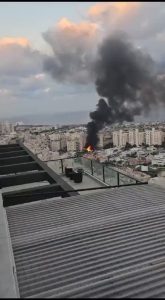Iran backed militia was behind the drone attack that targeted Iraqi Prime Minister Mustafa Al-Kadhimi late last week, according to allegations made by Iraq’s security officials. The blame comes weeks after the electoral defeat of pro-Iran groups.
However, according to reports from Reuters citing unnamed sources and analysts, Iran was not likely to be behind the violent attack as Tehran seeks to avoid violence on the western border.
The Iraqi officials alleged that Sunday’s attack was meant as a message from groups, who wanted to say that resorting to violence continues to be an option for them if they are not included in the formation of the government.
Also Read: Iraq PM assassination attempt: What we know so far about the incident
“It was a clear message of, ‘We can create chaos in Iraq – we have the guns, we have the means’,” said Hamdi Malik, a specialist on Iraq’s Shi’ite Muslim militias at the Washington Institute, according to reports from Reuters.
However, no group, organisation or individual has claimed responsibility for the attack, which has pushed tensions in Iraq as a ripple effect.
With boosted security measures and checkpoints stationed with law enforcement officials, the streets of Baghdad– Iraq’s national capital– seemed to be emptier and quieter a day after the attack on Prime Minister Al-Kadhimi, Reuters reported.
Helicopters circled in the Baghdad skies throughout the day, while troops and patrols deployed around Baghdad and near the capital’s fortified Green Zone, where the overnight attack occurred.
Also Read: Biden offers ‘appropriate assistance’ to Iraq following attack on PM
Prime Minister Mustafa al-Kadhimi suffered a light cut and appeared in a televised speech soon after the attack by armed drones on his residence. Seven of his security guards were wounded in the attack by at least two armed drones, according to two Iraqi officials, according to reports from Associated Press.
The incident has also attracted a wave of condemnation from the international community, which included United States President Joe Biden, French President Emmanuel Macron and UK Prime Minster Boris Johnson.






